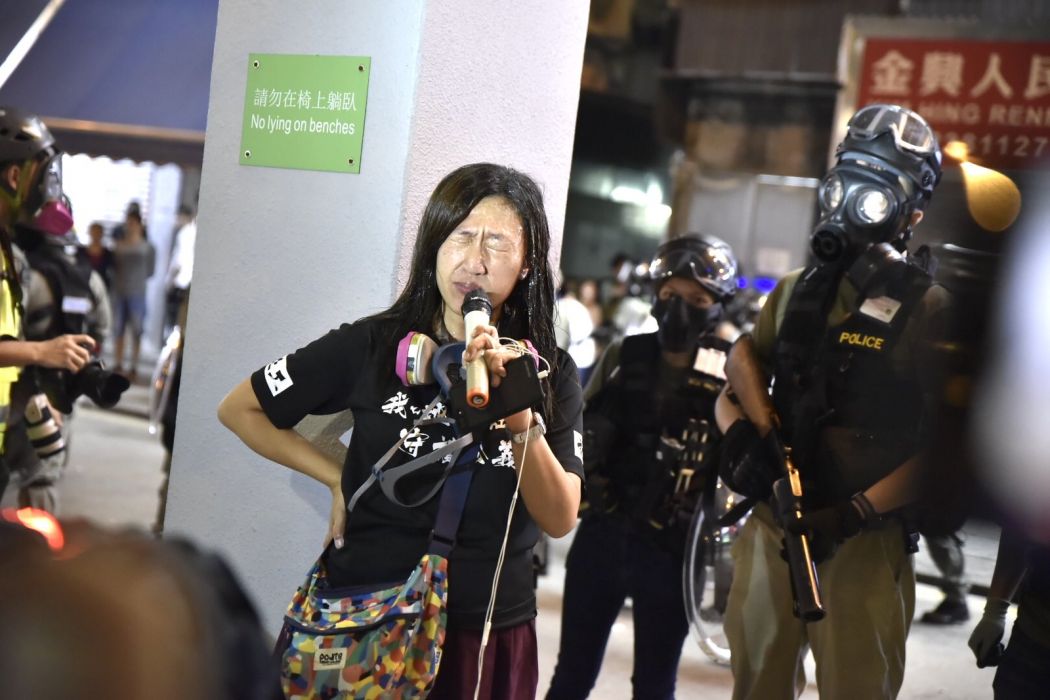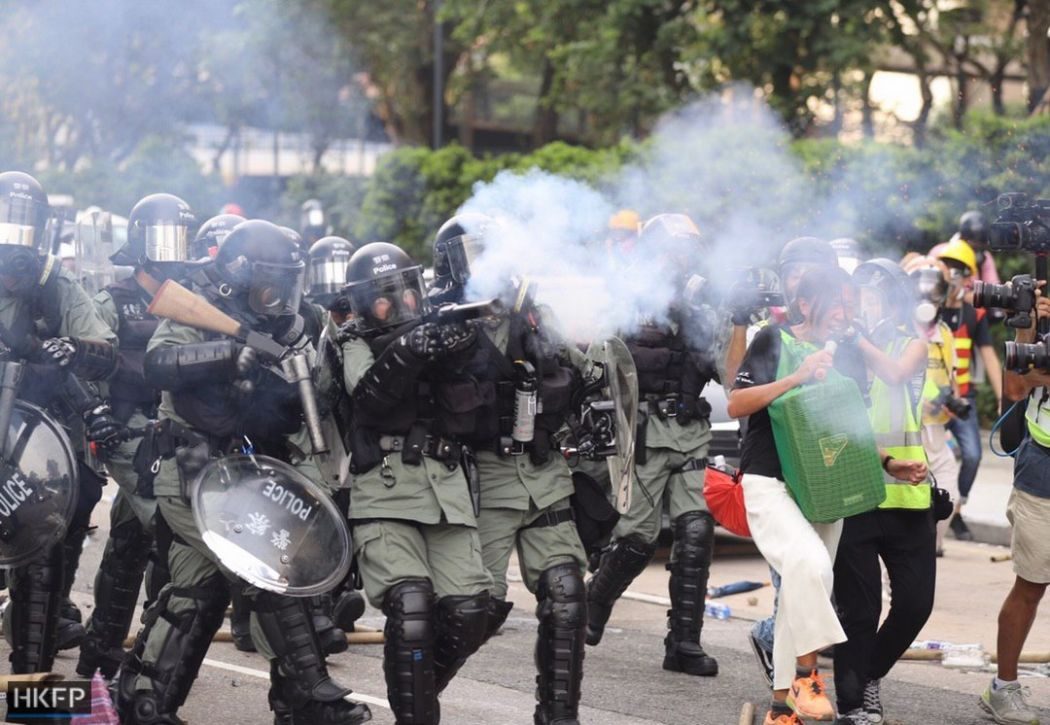Standing in front of a group of masked police officers with anti-riot gear was a woman continuing to yell into a microphone, as she squinted her eyes shut. Her face was covered in pepper spray, which the police had repeatedly fired at her at close range seconds ago.
She will have felt an unbearable burning sensation in her eyes, nose, mouth and skin, but the woman in a black t-shirt reading “we are social workers, safeguard justice” just pressed on.

“Your police officers are going crazy. Look, they keep spraying,” she shouted.
Anyone who has been to the frontlines of Hong Kong’s large-scale pro-democracy protests – which erupted last June over a now-axed extradition bill – would recognise this orotund voice. It belongs to Jackie Chen – a member of the Battlefield Social Worker group, who have volunteered to monitor police behaviour, liaise between protesters and the force, as well as provide emotional support at demonstrations.
Last October 31, Chen’s voice was squeakier than usual. A fellow social worker Key Luk was hit on the head with a police baton during a dispersal operation in Mong Kok. Blood dripping from his head was all over the ground and Chen sobbed before she turned on her microphone again to question the police action.
“It was – I think – the first time I ever cried at a protest,” Chan recalled during an interview with HKFP last month. “At that moment, I didn’t feel any pain [from the pepper spray]. It wasn’t until I got home and took a shower that I began to feel how painful it was.”
The 42-year-old said she felt responsible for Luk’s injury, as he was carrying two loudhailers for her. She wondered if he was targeted when officers tried to trace the source of the sound.
At a press conference a day after the incident, then-police public relations branch chief superintendent John Tse said police would not single out any profession, including social workers. But he said it would be difficult for frontline officers to distinguish each person’s role, and those remaining at the scene would be responsible for their own safety.
Chen, Luk and other social workers slammed the government and police chief as “tolerating” what they saw as police brutality. Chen, who often urged police not to deploy tear gas against reporters and residents without protective gear, said the force should stop sending “mentally unstable” officers to work on the frontlines.
“We want to rest too. Why do we have to come out? It is a silly question. Because the Hong Kong government did not listen to residents’ demands and allowed police to treat residents violently,” Chen said at a press conference last November. “We can’t disregard citizens’ lives, that’s why we are at the front.”
Chen is known for her “immunity” to pepper spray and tear gas, but she admitted she has succumbed to the stinging blue dye fired from water cannons. One time, she had to remove her clothes on the street while a group of young female first aid volunteers tried to scrub the stubborn pigment off.
“That time I was under-prepared and didn’t bring a raincoat. Now I always keep one with me and will run away immediately when I see a water cannon because the dye makes your whole body feel like it is burning up,” Chen described.
The registered social worker – who has been in the sector for 14 years – told HKFP that the role of frontline social workers has not been clearly defined. But they always refrained from acts that would make police consider them as participants of the protests, such as chanting slogans and singing protest songs.

Nevertheless, Chen was arrested twice at demonstrations and now faces a charge for rioting in Causeway Bay and Wan Chai on August 31 last year. Her trial is set to begin on September 8. She said the verdict of her case would likely become a precedent for other frontline social workers.
“When I was told I would be charged with rioting, my response was ‘oh.’ I refused to sign the notice police gave me, because I didn’t agree with charges,” said Chen, who is also a council member of the Hong Kong Social Workers’ General Union.
“An officer told me not to go to the front, and said he knows what my job is. Then I responded: ‘if you know what I am doing, how can I not do what I do?’,” she said.

Frontline trauma
It has been a year since the citywide unrest broke out, and Chen said the movement has taken its toll on a few Battlefield members. The group once expanded to include over 100 individuals during the peak of the protests, but almost half are taking a break, while some have quit, citing physical exhaustion and mental trauma.
Some members also told Chen that they were not well-prepared for the risks of getting injured or even arrested. Chen said she was more prepared than some of her co-workers because of her involvement in the 2014 Umbrella Movement.
“I know what I’m doing and I’ve thought about the worst consequences for every action that I take,” she said.
Chen’s determination to serve as a frontline social worker remains strong despite possible imprisonment, and her parents also have no way of stopping her. She explained the interesting family dynamics, where her pro-government and pro-police parents are at odds with her values.

“I know I can’t change their mindset, so we just avoid talking about politics. But sometimes I feel bad because I know they are worried about me – my mother always wants to attend my court hearings,” she said.
Some people have raised doubts over the effectiveness of telling police to calm down during chaotic skirmishes with protesters. Chen admitted that social workers had more success in de-escalating tensions in the early days, but officers now often ignore their reminders.
“We know we are only useful if the force is not completely out of control. If they still have a bit of conscience, our reminders would be important,” she said.
What kept Chen going was also the recognition within the social welfare sector. In early May, she received an Outstanding Social Worker award – an annual prize presented by the Hong Kong Social Workers Association. The award came as a surprise for Chen, but it was a validation of the professionalism of social workers, she said.

“The social worker sector understands what we are doing, and they support us to continue upholding our ethics,” she said.
Chen added she believes the presence of social workers at protest scenes has a more far-reaching impact on Hong Kong society. It takes away the social stigma of reaching out for help when a person is emotionally distressed, she said.
“Everyone has negative emotions bottled up and they need to accept that. Hongkongers should really take good care of themselves, because you are really fighting against totalitarian rule,” she said.
